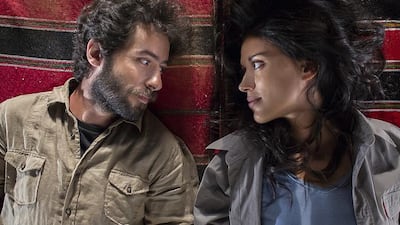Cherien Dabis is best known as the writer and director of 2009's National Geographic/Image Nation Abu Dhabi co-production Amreeka, the tale of a Palestinian woman who wins a United States green card in a lottery but finds that escaping her troubled homeland for the land of opportunity with her teenage son isn't quite the panacea she had hoped for.
The film became the most-screened Arab-directed film in US-cinema history, peaking at 40 screens across most major American cities.
Five years on, Dabis is aiming to repeat this feat with her latest movie May in the Summer, which opened on limited release in Los Angeles at the weekend and will hopefully follow Amreeka onto screens across the nation.
The film touches on some of the same themes of dislocation that were seen in its predecessor, but this time in mirror image. A successful American-Jordanian author, May Brennan (played by Dabis), returns to her family home in Amman to prepare for her wedding to Ziad, an American-Jordanian lecturer she met in New York.
Once again, things don't go smoothly. May's mother Nadine (Hiam Abbass, who also appeared in Amreeka) is a born-again Christian who disapproves of Ziad's Islamic faith, May's younger sisters seem to be able to cause a fight in an empty room and the philandering of her estranged American father (Bill Pullman) appears to be continuing unabated, even though he has traded Nadine in for a younger, Indian wife who is closer to May's age.
With so many Hollywood movies intent on portraying Arab characters as aggressors and so many Middle East-produced movies taking the exact opposite viewpoint, it’s refreshing to simply see a group of people, who happen to be Arabs, going about their lives – and with a good deal of humour, too.
Dabis agrees. “Just last night, an audience member said to me after a screening: ‘It’s just nice to know there are dysfunctional families all over the world’.”
The film seems to offer American audiences a timely reminder that those who live here are just people like them. That said, I suggest to Dabis that some of the things that may seem perfectly normal to audiences in the Middle East may well prove to be the most surprising to the American audiences.
“It has screened at quite a few festivals and one-offs already and it’s true that audiences do seem surprised, firstly by the familiarity of so many of the situations in the film, but also by the way their stereotypes are shattered,” she says. “We have really strong female characters in the film, we deal with the Jordanian Christian community – that’s really amazed people. So many people have said to me that they didn’t realise we had Christians in Jordan.
“One audience member remarked to me that even though the movie seems totally apolitical, just by virtue of making it I’ve made an anti-war story, that the movie’s very existence can be taken as a political comment. I guess if I’m going to be political that’s kind of how I’d like to do it.”
With both of her feature films to date dealing, to some degree, with the lack of understanding between western and Arab cultures, does Dabis consider herself to be on a mission to debunk myths surrounding the Middle East?
"Absolutely. It's the reason I became a filmmaker," she says without hesitation. "That doesn't mean I'll always make movies in that realm, but it's a big thing for me. Amreeka was inspired by what happened to my family during the first Gulf War in a small town in Ohio and the stereotypes I saw in the media. Our family was ostracised by neighbours we'd known for years. My sisters and I went to Catholic elementary school, we went to mass, but when the war began everyone thought we were Muslims. The secret service even came to school to investigate a rumour that my sister wanted to kill the president. There was so much confusion and ignorance. That was a real awakening."
However, Dabis says that in the past 10 years or so she has begun to notice a real shift in opinions in the US, with the current conflict in Gaza in particular causing many young Americans to question the accepted narrative, and she is determined to play her part in helping this along.
"I see my role very much as partaking in that change," she says. "People tell me this film has more commercial potential than Amreeka, so if we could achieve the same sort of success that would be great. I think the film has the same sort of entertainment value as a typical Hollywood comedy, but it also gently pushes some boundaries and touches on taboo topics, too."
Dabis is also looking forward to the film’s Middle East release – she remains a regular visitor to the region and is currently developing an Arabic film set in Palestine, and she still has family in Jordan and Dubai.
She explains that the film’s producers are in discussions with a regional distributor and she is hopeful of an autumn release, adding that ideally she’ll be able to make an official announcement at “one of the regional festivals” that are coming up.
cnewbould@thenational.ae

